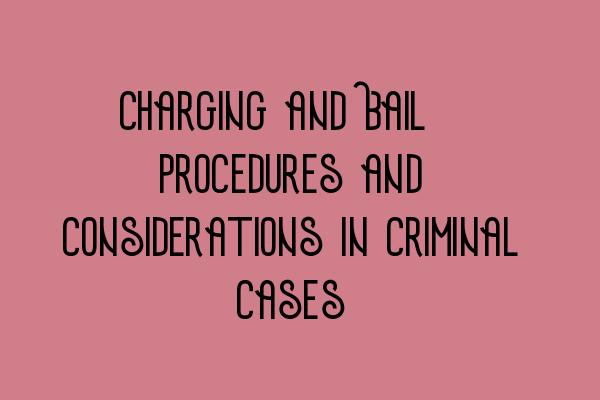Charging and Bail: Procedures and Considerations in Criminal Cases
In criminal cases, the process of charging and bail plays a crucial role in determining an individual’s freedom, rights, and legal obligations. Understanding the procedures and considerations involved is essential for both defendants and their legal representatives. This article explores the key aspects of charging and bail in criminal cases, providing valuable insights into this complex legal territory.
Charging Process
The charging process is the formal legal procedure by which someone accused of a crime is brought before a court. It begins with the police or relevant authorities gathering evidence and conducting investigations. Once the authorities have sufficient evidence, they will make a decision on whether to charge the individual with an offense. It is important to note that being charged with a crime does not equate to guilt; it is merely the initial step in the legal process.
- SQE 1 Practice Exam Questions: Gain valuable practice with mock exam questions to enhance your understanding of criminal law and procedure.
- SQE 1 Practice Mocks FLK1 FLK2: Access comprehensive practice mocks to assess your knowledge and readiness for the SQE 1 exam.
Bail Considerations
After being charged, an individual may be eligible for bail while awaiting trial. Bail is the temporary release of an accused person, with or without certain conditions, pending their trial. The decision to grant bail is based on several factors, including the seriousness of the alleged offense, the individual’s criminal history, ties to the community, risk of flight, and potential danger to the public. The court will carefully assess these considerations before granting or denying bail.
A further consideration in the bail process is the imposition of financial conditions. Bail may require the accused to provide a monetary amount or surety to ensure their appearance in court. Failure to comply with the bail conditions may result in arrest and further legal consequences.
- SQE 2 Preparation Courses: Enhance your legal knowledge and expertise in criminal law and practice through our comprehensive SQE 2 preparation courses.
- SQE 1 Preparation Courses: Master the fundamentals of criminal law and procedure with our specialized SQE 1 preparation courses.
- SRA SQE Exam Dates: Stay updated with the upcoming SQE exam dates to effectively plan your study and preparation.
It is important to note that the granting of bail is not an automatic right, and the court’s decision may vary based on the circumstances of each case. Legal representation is crucial in presenting a strong case for bail, ensuring that the defendant’s rights are protected throughout the process.
Conclusion
The charging and bail procedures in criminal cases are intricate and require a comprehensive understanding of the law. Defendants and their legal representatives must navigate these processes with care and expertise. By being aware of the considerations involved, individuals can make informed decisions and work towards ensuring their rights are upheld. Professional legal assistance is invaluable in addressing charging and bail concerns effectively.
For more information and resources on criminal law and practice, including preparation courses and exam dates, please visit SQE Criminal Law & Practice Law UK.
